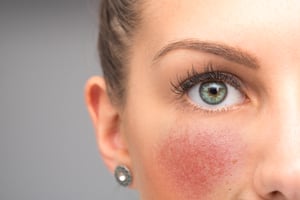 Rosy cheeks have always been touted as a good thing. They are said to give you a youthful glow, and women have long used cosmetics like blush to help achieve the look. However, when rosy cheeks turn red and inflamed due to rosacea, it is anything but desirable.
Rosy cheeks have always been touted as a good thing. They are said to give you a youthful glow, and women have long used cosmetics like blush to help achieve the look. However, when rosy cheeks turn red and inflamed due to rosacea, it is anything but desirable.
Rosacea is a dermatologic skin condition in which the skin on the face appears flushed. It can also be accompanied by visible blood vessels, small pus-filled bumps, dry and irritated eyes, hot and tender skin, and thickening of the skin on the nose. In some instances, it may even be mistaken for acne. However, unlike acne, which is most commonly associated with youth in the teenage years, rosacea most prominently affects white women of middle age.
Causes of Rosacea
So, what exactly causes this midlife flushing and inflammation of the skin? The truth is that not a single cause can be pinpointed. Instead, there is likely a combination of factors, and patients and their dermatologists must work together to determine which elements are likely to aggravate the skin. Environment, genetics, and a potentially overactive immune system may all be at play. While patients may be unable to control their immune system response or their genetics, they can work to identify triggering environmental factors. These may include certain cosmetics, alcoholic beverages, excessive sun or wind exposure, or extreme temperatures.
Finding the Best Rosacea Treatment for You
In addition to identifying and limiting these factors, a dermatologist can help patients control their rosacea flare-ups using prescribed ointments or medications. Commonly used treatment methods include:
- Topical ointments - Medications to help reduce the hallmark flushing of rosacea include Brimonidine and oxymetazoline. These ointments work to address the appearance of rosacea by constricting blood vessels, thereby making them less visible.
- Oral antibiotics - Oral antibiotics may be used if rosacea falls in the moderate to severe spectrum and is accompanied by acne.
- Prescription acne medication - An acne medication may be useful for rosacea with pimples. Mild cases may be treated topically, while severe cases might require a more powerful oral medication.
- Laser therapy - Laser therapy can help address some cases of rosacea by reducing the visibility of blood vessels.
If you are suffering from the discomfort and embarrassment of rosacea, options are available. Schedule an appointment with a dermatologist like those at Lane Dermatology to begin the process of finding a solution that can work for you.




